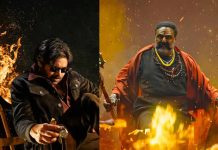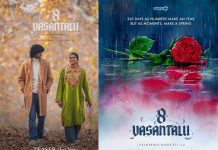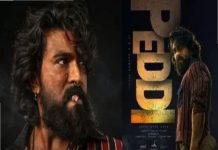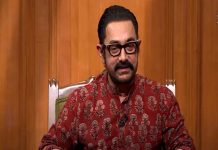She is young, dynamic and full of beans. The immensely talented Apoorva Shaligram has already made her presence felt with two Telugu films as a cinematographer and is waiting to spread her wings. In a brief chat with Y.Sunita Chowdhary of the Klapboardpost.com, the technician from Maharashtra says she loves challenges and is hungry to push boundaries. Right now she is in the news for ‘Ammu’ that is streaming on Amazon Prime. We ask her about her family and how she got to choose cinematography as her career. She shares, “My forefathers are from Karnataka border. In Karnataka, there is a village called Shali and many generations back, my folks moved to Maharashtra and there are no roots anymore; That’s how I got my surname and I definitely am a Maharshtrian. About my introduction to the camera, my granny gave me a camera when I was a child. She was a theatre artiste, now she is no more. She is the only connection for me in art. Since then I was more into clicking photos, developing it and understanding the process. It was a time when I passed out of school and I liked it so much that I took up a still photography course in the tenth standard vacation, just to understand the technical aspects of it.” Apoorva graduated in psychology and towards the end of the third year BA, UNICEF hired her as a documentary cinematographer. She learnt editing on the job. Her father was instrumental in getting her this job. He was a social worker and she too put in her effort to satiate her curiosity and grabbed every bit of information, upgraded herself. She adds, “I was getting fellowships for making films for NGOs. It was not a paid job but worth the experience. At the age of twenty, I explored eleven states. I would go to these remote areas for around eleven months and was rich with experience. I would edit whatever I shot. I realised I loved shooting more than editing.”
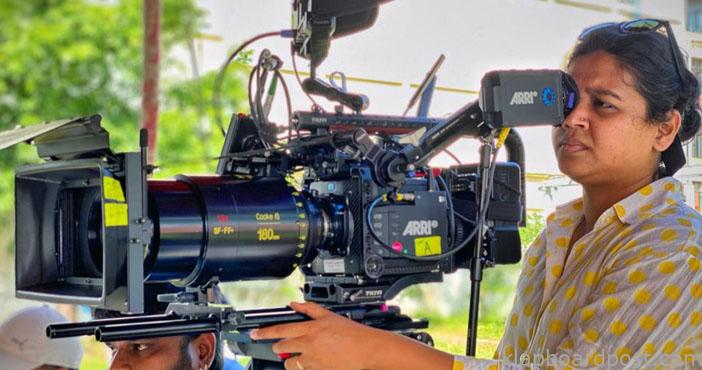
Were her parents okay with her decision of choosing this career? Did she face challenges at work? “I am a single child and mom wanted me to do editing and not be on the field. When I was working for Cinema Bandi and Ammu, I didn’t meet my parents for a couple of months and obviously they were worried because I hardly eat and sleep. Actually, how I speak on the sets will surprise those who know me, I am altogether a different person. Once mom saw me on the set and said she couldn’t believe that I was her daughter. Well, about the career..I got an admission in Whistling Woods after this stint and it was for two years; It helped me know the basics. I took up the course because I don’t have a film background, we are very simple people and have no roots in the film industry. It is scary for the family and relatives because I work in this industry. We do have night shifts but people talk and have a wrong perspective. Now it isn’t bad. My parents are hugely supportive and it is because of them, I am able to do so much but there will be an extended family that will pass absurd comments. It is a difficult journey. My first project I did was as an intern. I worked for a month and there was no break..i.e each day 16 hours and I wasn’t getting a break. People do try to tease you, get smart but as an assistant cinematographer I knew how to handle the situations. I admit I was shocked at the people’s behaviour and talk initially.”
When Apoorva was at the film school, her grades were low and the HODs told her that she should consider editing. She was focussed on pursuing cinematography and was adamant on taking it up as a career. As a DoP, she did Cinema Bandi and Ammu and prior to that as an assistant, she worked in five films..out of which one is C/O Kancharapalem. Apoorva also worked on videos, advertisements etc and she likes to choose her work carefully. After the streaming of Cinema Bandi and the rave reviews it got, she didn’t get any project probably because the film appeared very simple. On the other hand, the movie helped others like the director, writer, and artists get work. She sounds perplexed, “How do you measure appreciation? We get back to back work right? I was depressed a bit, I sent the trailers to many producers but none called me back. It looked very simple but the way I shot was not that simple. They don’t know how much risk I had taken and what I had done. I didn’t use one piece of professional lighting, of course I did save the money for the production but this never came out. If a production wants to hire a DoP, they see how much they spend. Ideally in my head, they should hire me but it isn’t happening. Also I don’t live in Hyderabad right?,” questions the technician.
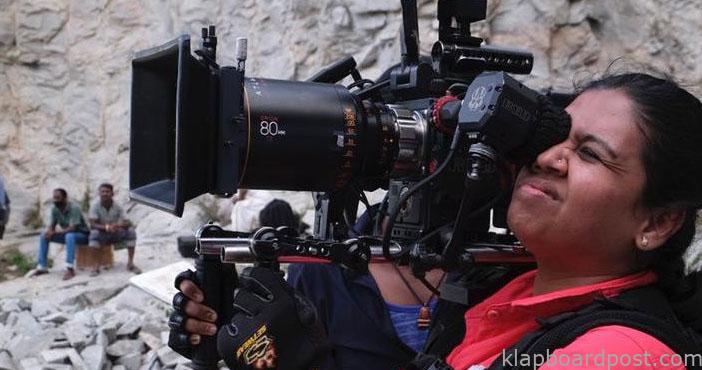
Has there been any creative decisions taken by her that enhanced the visual quality of her films? “My decision was to not make the film look glossy because it overpowers the cinematography. Story is God and what I did was to go with my gut feeling. The story of Ammu is universal and any person can relate to it. I genuinely put myself in Ammu’s shoes, letting the camera become more observant. The focus is not on the face..too much ruins the image especially when the story is simple, normal and the issue is faced by half the universe. Using three lights is easy but doing the three lights work with one light is not simple, it is more work.” If she is placed in a commercial film set up, how will she elevate the emotional quality of a scene? “I will have a lot of talks with the director. Commercial cinema can also be nice with a good script. It is about how people put on a song or a dance number etc… it adds to the money for the film. Commercial films are important, we should know how to execute them. Just like how the cinematography is different from Cinema Bandi and Ammu…so too the process will be different for commercial cinema. Each script is unique, once we get it we start visualizing it,” she says.
Isn’t it a dream of every DoP to work with great directors? “Charukesh Sekar is fantastic, same with Praveen Kandregula also. I like to work with all directors of all generations as I learn something from them. I look for collaboration in work and a film set is not a war ground,” she says How has the association with director Charukesh been and what was the visual strategy? She recalls, “Charukesh Sekar is a great narrator, he believes in improvisation. We follow fifty percent of what we have decided earlier and the rest fifty we improvise. Cinema Bandi was also an improvisation. Apart from the story, the actors were new and we had to make changes. My previous experience helped with Ammu. I was very open. Some DoPs go with the plan but if something happens beyond the plan, they get unsettled. I am more flexible, open and adaptive. My thinking is calm on sets and I know how to give space to my actors and directors. Some say don’t cross this line otherwise they wouldn’t be catching this light. Lot of cinematographers do in fact tell their directors to catch this light and that light. I tell my directors to wherever they feel like, he should be doing what the character tells him. I will adjust myself. With Ammu, there wasn’t a single light in the police station, in the house.had .. there was no light standing next to them and they had to act. I create a set that looks realistic and the moment they enter the set they should know it is a police station. There shouldn’t be any distractions. Once the director and actor step into the set they should feel comfortable so that they can focus on improvising.”
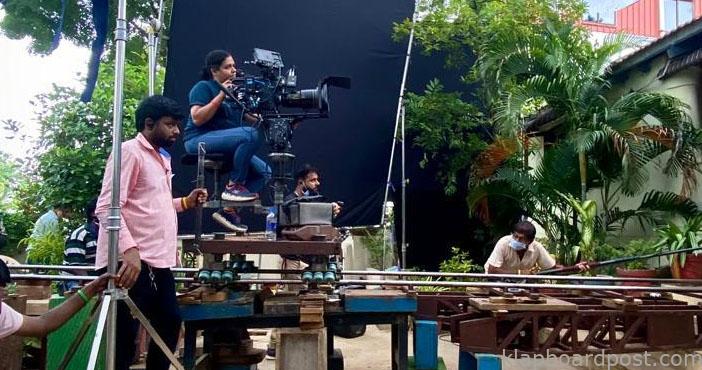
Apoorva is open to working in a film in any language. She has no language barriers and states that she doesn’t want to say yes and no to a film because of its language. “It is a barrier unless someone insists on making you feel it is a barrier. South films are being made by international cinematographers too. Our work is not to primarily understand the language. It is to understand the scene, story, script and beyond that if people say she is from another state, that is in their mind,” she says confidently. About the challenges she faced on the sets of Ammu, “There is a certain comfort level when you talk to your actors. All the artists and the director were so supportive. It is nice if people make you feel normal and not like an outsider. The shoot was challenging of course. The lighting and camera team were extremely supportive. The shoot in Bobby Simha’s room was indeed challenging. In the real location, there was space for only two people to stand as the room is very tiny but it does look big on screen. Also there is a bus scene where Ravi (Naveen Chandra) leaves Ammu (Aishwarya Lexmi). It is shot on a real bus stand. We lit up the place and putting up tubes took us three hours. There were a lot of scenes shot in the night and looking at the output, none can say we have done it at that time. Everybody put their heart and soul into it and there were so many tight close ups I wanted to take, especially of Naveen Chandra. It is great team work otherwise one can’t deliver such a project.”
Finally, Apoorva waxed eloquent on the director, he had given her a lot of confidence. “If I put this kind of visuals, a lot of it comes from the director. He let me be, and trusted my opinion. For Cinema Bandi, I thought if I use light it will become like a film. I wanted to put life to the image ..didn’t want to say that I will use only natural lighting. What can one do if there is sun on one day and nothing the other. I optimise but don’t compromise either when the situation demands.”

